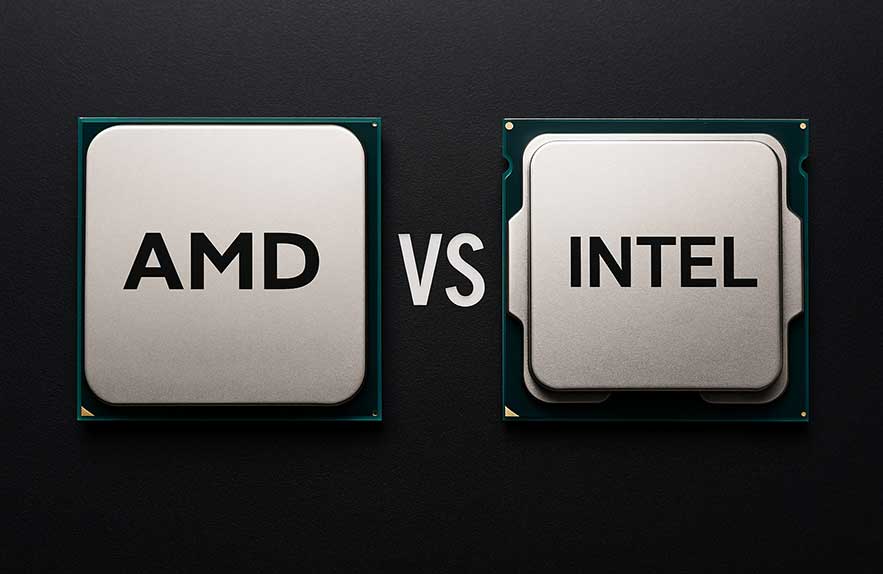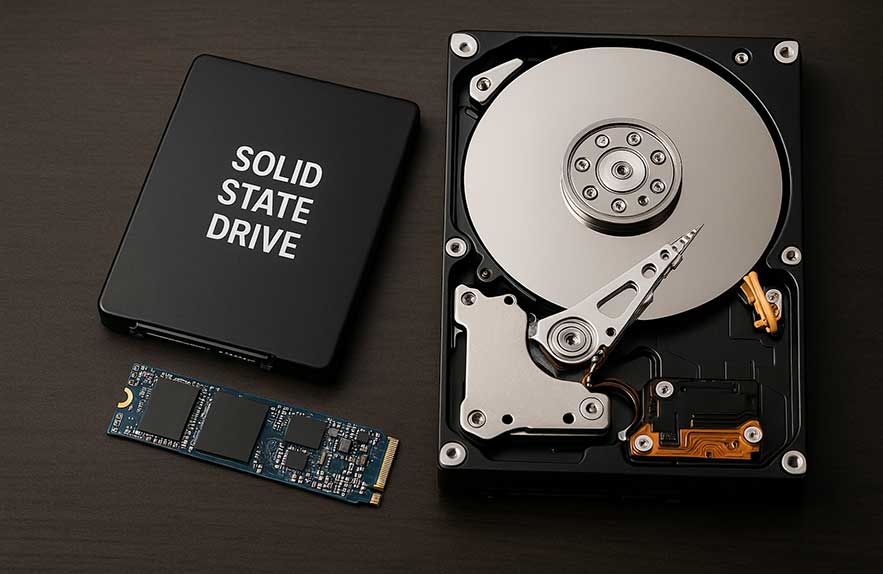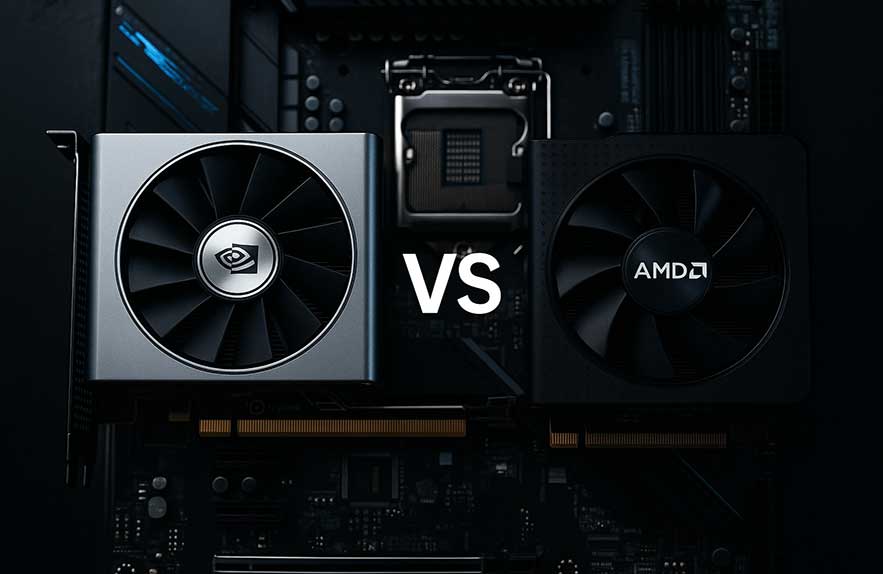
Intel vs AMD: Why This Battle Matters in 2025
Intel vs AMD is the classic rivalry in the world of computer processors, and in 2025 this debate is more relevant than ever. Anyone building or upgrading a PC will run into this question sooner than later. Whether you are a gamer looking for higher frame rates, a student who wants smooth multitasking, or a professional who edits videos all day, the battle of intel vs amd shapes the performance and price of every modern computer. Understanding these two brands—how they got here, what has changed, and why there is no easy winner anymore—matters for anyone who wants the best value from their next CPU investment.
For decades, intel vs amd has been the engine pushing speeds and innovation forward. In the early days, Intel’s processors dominated almost every PC, from office towers to home desktops. AMD was once considered a budget alternative, loved by hobbyists who wanted more computing power for the money. Over time, however, the landscape has shifted dramatically. As of 2025, there is no longer a clear underdog in this amd vs intel contest. Both companies have made giant leaps in performance, power efficiency, and overall user experience. The result is a PC market that is more competitive, faster-moving, and more exciting than ever before.
The greatest change in the intel vs amd battle is how each brand has responded to competition. Intel focused on refining their architecture, boosting single-core speeds, and offering dependable performance that appeals to gamers and creators who want top-tier reliability. Meanwhile, AMD rolled out CPUs with more cores and threads, which let users tackle multiple demanding tasks at once. This move made AMD increasingly attractive not only to tech enthusiasts, but to professionals who need to edit video, crunch data, or run heavy software. For shoppers in 2025, amd vs intel choices are rarely about finding “the fastest” chip—it’s about matching your needs to the genuine strengths of each brand.
A big reason the intel vs amd cpu rivalry matters is because it pushes both sides to keep prices in check and innovation high. Mainstream buyers benefit from breakthroughs first made for gamers or creative pros. At the same time, AMD and Intel each have devoted fanbases, sparking passionate discussion over every new release, benchmark, or gaming review. For newcomers, this means more options and smarter features—if you know what to look for.
In 2025, choosing your side in the intel vs amd debate means understanding more than just clock speeds. It means weighing multitasking power, future-proofing, upgradability, and even whether you want an efficient laptop or a maxed-out desktop. In the next section, we will dive into direct amd vs intel performance comparisons and help you see which CPU shines for gaming, creative workloads, and multitasking in real life.
Table of Contents
- Intel vs AMD: Why This Battle Matters in 2025
- Performance Comparison: Gaming, Productivity, Everyday Use
- Latest CPU Lineup: Intel 14th Gen vs AMD Ryzen 7000 Series
- Power Efficiency and Cooling: Critical but Overlooked
- Final Verdict: Should You Choose Intel or AMD in 2025?
Performance Comparison: Gaming, Productivity, Everyday Use
The real excitement in the intel vs amd debate often comes down to performance. When people compare amd vs intel, the questions are simple: Which is better for gaming? Which processor handles work tasks faster? Can you really feel the difference in everyday computer use? Looking at benchmarks, user reviews, and hands-on tests, the comparison between intel vs amd cpu models in 2025 has never been more interesting or more competitive.
Let’s talk about gaming first. For years, Intel chips were the top pick for gamers who needed the highest possible frame rates. Intel focused on strong single-core performance, which means their processors are great at handling the main tasks most games rely on. But in recent years, AMD has caught up and sometimes overtaken Intel, especially with its newer multi-core designs found in the Ryzen lineup. Modern games now take advantage of more CPU cores, and that is where AMD’s approach shines. In the actual matchup of amd vs intel cpu for gaming, the winner often comes down to which brand’s latest release fits your graphics card, your monitor’s refresh rate, and the titles you play most often.
When it comes to productivity tasks such as video editing, rendering, or working with large spreadsheets and databases, the amd vs intel comparison shifts again. AMD CPUs offer more cores for the price, making them attractive for those who run several heavy programs at once or need to multitask constantly. Creative professionals who edit video footage or develop code often find they can finish projects faster with an AMD setup.
Intel is no slouch, though—their high-end chips have kept pace in professional benchmarks. For those who want absolute stability, longer product support, and compatibility with certain software, Intel still wins certain niche categories. If you want to see the latest productivity and gaming benchmarks head-to-head, Tom’s Hardware CPU rankings are updated monthly with side-by-side test data.
For everyday users and students who mostly browse the web, use office apps, join video calls, or stream media, intel vs amd cpu competition is a win-win. Both brands now offer fast, energy-efficient processors in affordable desktops and laptops. You no longer have to worry about picking the “wrong” brand—both handle these daily tasks extremely well. You will see the bigger differences if you push your computer to the limit or need specialized software that prefers one brand’s approach.
In the end, choosing between amd vs intel cpu for performance depends on your unique needs. Gamers with high-end budgets may lean toward whichever brand just released the fastest chip for graphics-heavy play. Content creators and multitaskers could get better value from AMD’s impressive multi-core processors. General users are spoiled for choice and can focus on price, warranty, and features instead of brand loyalty alone.
Up next, we will break down the value equation—how finished builds and upgrade costs compare between amd vs intel, and what to expect at different price points in 2025.
Latest CPU Lineup: Intel 14th Gen vs AMD Ryzen 7000 Series
The big question for many buyers in 2025 is which modern chip delivers the most for the money—the newest amd ryzen 7 vs intel i7 models. This is where the broader intel vs amd cpu conversation becomes specific and practical. Both AMD and Intel have released impressive updates, with their latest Ryzen 7000 and 14th Gen Core i7 processors leading the charge for gamers, creators, and power users everywhere.
Let’s look at the specs in beginner-friendly language. AMD’s Ryzen 7 CPUs tend to offer eight powerful cores and support for up to sixteen threads, which means they can handle multiple heavy tasks at once. This makes them a top option for anyone who does a mix of gaming, video editing, or big multitasking projects. Intel’s Core i7 processors match or even exceed this spec in many ways, now regularly offering eight cores or more, with higher clock speeds designed to squeeze out even better performance in quick, demanding workloads.
For gaming, the amd ryzen 7 vs intel i7 matchup is extremely close. Gamers will find smooth frame rates, high performance at high settings, and little to no real difference in recent titles. Sometimes, Intel pulls ahead in games that reward raw clock speed and strong single-core power. Other times, AMD takes the lead in applications and games that love having more threads. The gap is often just a few frames per second, more influenced by your graphics card and monitor than CPU brand alone.
When it comes to creative or professional workloads, more cores and threads really shine. Video creators, 3D designers, and coders who render big projects or run demanding software often pick AMD Ryzen 7 to maximize performance for their money. File exports and batch-processing times drop, and having extra threads in reserve can make the system feel smoother under heavy load. That said, newer intel vs amd cpu models are also closing this gap with better multitasking, memory support, and even AI-enhanced productivity features.
For most daily computing, including photo editing, web browsing, and moderate gaming, both chips excel. Specs are less important than reliable performance and support for your favorite apps. When comparing amd vs intel cpu, be sure to check for compatibility with your motherboard, cooling requirements, and future upgrade options. The processor you pick today should fit both your current projects and your next round of upgrades. To compare specific models, benchmarks, and real-world feedback, TechRadar’s AMD vs Intel comparison offers up-to-date reviews.
This head-to-head between AMD Ryzen 7 vs Intel i7 shows how far both brands have come in recent years. In the next section, we will see why power efficiency and cooling matter—especially if you are building a system for long gaming sessions, professional work, or use in a laptop.
Power Efficiency and Cooling: Critical but Overlooked
Performance is not the only factor in the intel vs amd debate. How much power your CPU uses and how hot it gets are critical for getting the most out of any build, whether you are running a desktop or choosing a laptop. Some users find that these practical concerns—power efficiency and cooling—affect day-to-day reliability and even long-term performance just as much as benchmarks do. Understanding how intel vs amd cpu models handle heat and power draw will help you create a system that stays fast, silent, and durable.
Let’s start with Intel’s latest chips. Modern Intel CPUs provide amazing speed, especially when under heavy load or in tasks that need short bursts of power. But along with that speed comes higher power draw in many high-end models. If you are building a desktop, expect to need a strong power supply and a reliable cooling solution. High-performance Intel processors can run warm, which means larger air coolers or even liquid cooling is worth considering—particularly for gaming machines or content creation workstations that see intensive use.
AMD, on the other hand, has focused on keeping power use low while still pushing impressive performance. Many amd vs intel cpu comparisons now show AMD’s Ryzen chips running cooler and drawing less energy, especially in midrange models. This means that smaller, quieter coolers often work just fine, which is good news for compact desktops, home offices, or anyone hoping to cut noise levels. Power efficiency also matters for electricity bills over time, and in laptops, helps keep batteries running longer between charges.
Cooling is a key factor no matter which CPU you pick. Even the best processor will slow itself down to protect from overheating if temperatures get too high. A good cooler—whether it is a quality air heatsink or a liquid-based system—keeps CPU temperatures in check and lets your processor maintain peak performance for longer. It is worth learning how your chosen chip handles heat. Some CPUs are more forgiving and work fine even with basic cooling, while others push their limits for extra speed and need a bit more attention to airflow and fan setup.
The trade-off between power efficiency and raw power is bigger in laptops. Efficient CPUs mean a cooler, lighter laptop with longer battery life—something both students and professionals now expect in a mobile workstation. For this reason, more laptops in 2025 are using CPUs that prioritize energy savings as much as outright performance. To get the most from intel vs amd cpu choices in mobile devices, it is smart to compare battery tests and real-world usage, not just clock speed or core count. For expert breakdowns of CPU cooling and power draw in all the newest chips, Notebookcheck’s CPU comparison resource is updated with thermal data and cooling advice for dozens of models.
Knowing how much power your CPU will use and what type of cooler you will need can help prevent frustration, avoid noisy fans, and even add years to your system’s life. In our final section, we will put everything together and help you decide if AMD or Intel best fits your goals in 2025.
Final Verdict: Should You Choose Intel or AMD in 2025?
As you wrap up your research, it is clear that the amd vs intel cpu decision in 2025 is less about right and wrong and more about finding the best fit for your unique needs. AMD and Intel are both making top-tier processors, and that is exciting for buyers at every level. The days when one brand always won on price, performance, or cool features are over. Instead, users get to focus on what matters most for their work and play.
For gamers who want the highest possible frame rates or plan to pair their new chip with a powerful graphics card, both brands deliver. Intel still edges ahead in some high-refresh titles thanks to impressive single-core speeds, but AMD’s advances in core and thread counts mean that more games than ever run beautifully on either platform. When comparing amd ryzen 7 vs intel i7, the gap is razor-thin—it often comes down to which model is on sale or which features fit your motherboard best.
Creators who edit video, process large images, or run many programs at once may find AMD’s multi-core chips provide better value for their money. Multitasking, heavy rendering, and running several pro apps together benefit from AMD’s efficient processors and generous thread support. Intel’s latest releases close this gap for professionals who also want budget-friendly options or need excellent software compatibility. General users, on the other hand, will find both amd vs intel cpu families can handle web browsing, document creation, and video calls without breaking a sweat.
When making your decision, consider not just performance numbers, but also power efficiency, upgrade potential, and cooling needs. Think about the size of your case, whether you want a silent or cool-running PC, and how much you care about battery life for laptops. For personal builds, check comparison charts like PCMag’s AMD vs Intel guide to see up-to-date recommendations for every budget and skill level.
No matter which brand you choose, feeling confident about your amd vs intel cpu decision means weighing price, performance, and reliability. Choosing between two industry leaders has never been so rewarding for users. With a little research and clear priorities, you can build or upgrade a computer that keeps up with everything you do in 2025 and beyond.

